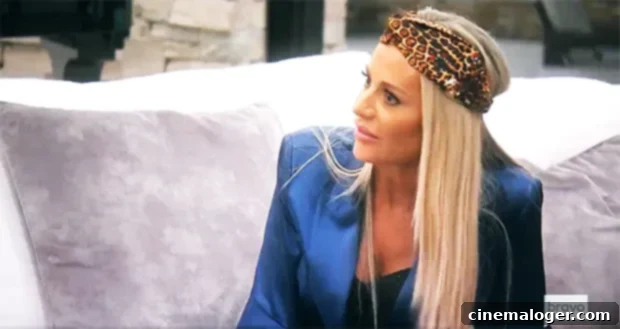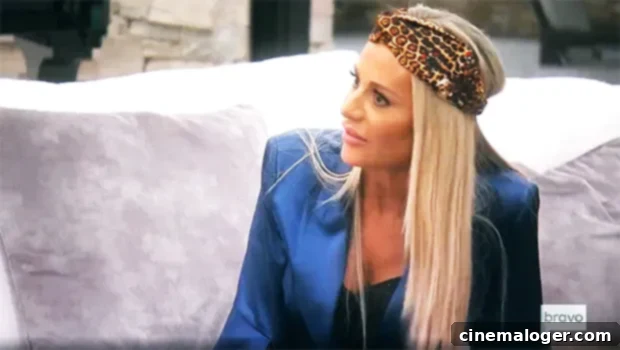Crystal Kung Minkoff Confronts Dorit Kemsley: Unpacking the RHOBH Validation Debate
The latest installment of The Real Housewives of Beverly Hills delivered a significant dose of raw emotion and interpersonal conflict, as Crystal Kung Minkoff found herself at odds with Dorit Kemsley. Airing on Wednesday, May 25, the Bravo episode saw Crystal vocalizing her deep-seated frustration, accusing Dorit of failing to validate her feelings and leaving her feeling “irrelevant” within the group dynamic. This contentious exchange unfolded against the backdrop of Dorit still reeling from a terrifying home invasion, a trauma that undeniably cast a shadow over her emotional availability and perspective. Dorit, visibly taken aback by Crystal’s accusations, vehemently denied them, stating, “It’s not true, Crystal. That is not true.” This initial clash set the stage for one of the season’s most emotionally charged confrontations, highlighting the complexities of friendship and communication under the intense scrutiny of reality television.
Crystal’s plea for validation stems from a deeper need to feel heard and understood, a recurring theme in her journey on RHOBH. Her insistence on the truth of her feelings underscores a common struggle many face in relationships: the desire for one’s emotional experience to be acknowledged, even if not fully comprehended by another. For Crystal, this wasn’t merely about winning an argument; it was about having her inner world seen and respected. The dynamic between her and Dorit has always been fraught with subtle tensions, often revolving around perceived slights or miscommunications. This particular confrontation, however, brought those underlying issues to a boiling point, exacerbated by the public nature of their discussions and the presence of their fellow cast members.
View this post on InstagramA post shared by Queens of Bravo (@queensofbravo)
The Clash Escalates: Garcelle Steps In
“It is,” Crystal retorted, unwavering in her conviction. “Get real.” The tension in the room thickened considerably when Dorit, clearly frustrated, shot back with a highly charged question, asking Crystal if she was “out of her f***ing mind.” This aggressive retort only served to fuel the fire, drawing in Garcelle Beauvais, who quickly stepped in to defend Crystal. Garcelle, known for her empathetic and grounded approach, calmly interjected, “This is how she feels. Again, you’re not validating how she’s feeling.” Garcelle’s intervention underscored the central issue: Dorit’s difficulty in acknowledging Crystal’s emotional experience, even if she didn’t fully grasp its origins. Despite Garcelle’s clear explanation, Dorit reiterated her stance, insisting that she was “trying to understand” Crystal’s feelings, a distinction that proved crucial yet challenging for Crystal to accept as genuine validation.
The nuanced difference between “understanding” and “validating” often becomes a flashpoint in interpersonal conflicts. To understand means to grasp the meaning or significance of something; to validate, however, is to acknowledge and accept someone’s feelings as real and legitimate, even if one doesn’t personally agree with or fully comprehend them. For Crystal, Dorit’s repeated attempts to “understand” felt like a deflection, a sidestepping of the immediate emotional need for her pain to be simply recognized without judgment or immediate problem-solving. This communication breakdown is a common pitfall in high-stress situations, especially on a show like RHOBH where emotions run high and personal histories are often intertwined with present-day disagreements.
Crystal’s Emotional Exit: “Not a Safe Space”
After more heated back-and-forth, with neither woman seemingly able to bridge the communication gap, Crystal made a pivotal decision. Acknowledging the challenging period Dorit had been enduring post-home invasion, Crystal decided to disengage from the escalating conflict. She announced her departure to her fellow cast mates, including Sutton Stracke, Kyle Richards, and Erika Jayne. “This is not a safe space for me. I don’t feel good in this place,” Crystal shared, her voice laced with palpable distress. Her declaration resonated deeply, highlighting the emotional toll such public disagreements can take. For Crystal, the environment had become emotionally untenable, forcing her to prioritize her own well-being over continuing a conversation that felt unproductive and invalidating. This moment underscored the fragility of group dynamics and the importance of individual boundaries, especially when one feels their emotional needs are being overlooked.

The Validation Dilemma and Diana’s Unexpected Support
Despite Dorit’s subsequent attempts to apologize, Crystal’s frustration continued to boil over, extending her critique to both Dorit and Kyle Richards. “You guys will never validate someone’s feelings unless you can understand it,” she explained, articulating the core of her grievance. “That is the truth. I’ve expressed so much about my history and my pain, to tell you guys how I feel, and you guys don’t listen. You don’t care.” This powerful statement laid bare Crystal’s feeling of being repeatedly dismissed, suggesting a deeper pattern of her emotional contributions being undervalued by certain members of the group. As Crystal attempted to leave, declaring everything “too dramatic,” Dorit and Kyle tried to console her, but their efforts seemed to miss the mark. Again, Garcelle gently reminded the women that they were still failing to truly hear Crystal out, emphasizing the persistent communication gap. It was at this crucial moment that new Housewife Diana Jenkins, making a notable entrance into the group’s dynamics, declared herself Crystal’s “bodyguard” and rose to accompany her out, a surprising show of solidarity that instantly shifted the energy in the room and signaled potential new alliances.
Crystal’s accusations of Dorit and Kyle not caring or listening are significant. They point to a perceived lack of empathy and a tendency for some cast members to center their own understanding rather than offering unconditional emotional support. For Crystal, her “history and pain” are integral to her present emotional responses, and the failure of others to acknowledge this background felt like a dismissal of her entire being. The desire for validation, in this context, wasn’t about demanding agreement, but about seeking acknowledgment of her reality. This kind of emotional labor, where one person tries to explain their inner world to others who seem unwilling or unable to grasp it, can be incredibly draining, ultimately leading to the feeling of being in an “unsafe space.”
“I’m not being heard,” Crystal reiterated to Dorit, a desperate plea summarizing her entire experience. “I don’t know how else to explain it.” This profound sense of emotional isolation was the catalyst for her departure, with Diana Jenkins physically ushering Crystal out of the building. The image of the two women leaving together left the remaining housewives stunned and reeling, grappling with the immediate aftermath of such a dramatic exit. The episode concluded with a palpable tension, leaving viewers to ponder the long-term ramifications of this significant clash on the group’s already complex relationships. This confrontation serves as a powerful reminder of the delicate balance required to maintain friendships within a high-pressure environment, where individual traumas and past hurts constantly intersect with present-day interactions.
Broader Implications for RHOBH Dynamics
This incident highlights several key aspects of the *Real Housewives* franchise: the raw emotional vulnerability that cast members often display, the challenges of communication within large social groups, and the inevitable clashes when different personalities and emotional processing styles collide. Crystal’s consistent need for validation, rooted in her self-professed “history and pain,” sets her apart from some of her more outwardly resilient or deflective castmates. Her struggle emphasizes the show’s capacity to explore genuine human emotional needs and the difficulty of finding empathy, especially when other individuals, like Dorit, are also grappling with their own significant traumas. The emergence of Diana Jenkins as Crystal’s “bodyguard” also signals a potential shift in the group’s allegiances, possibly setting the stage for new dynamics and future conflicts as the season progresses. This dramatic episode solidifies Crystal’s position as a Housewife unafraid to express her authentic feelings, even if it leads to intense confrontations, making her a compelling figure to watch.
Want more of the captivating drama and emotional rollercoasters? The Real Housewives of Beverly Hills airs every Wednesday at 8pm ET on Bravo. Don’t miss out on how these intricate friendships and explosive conflicts continue to unfold.
